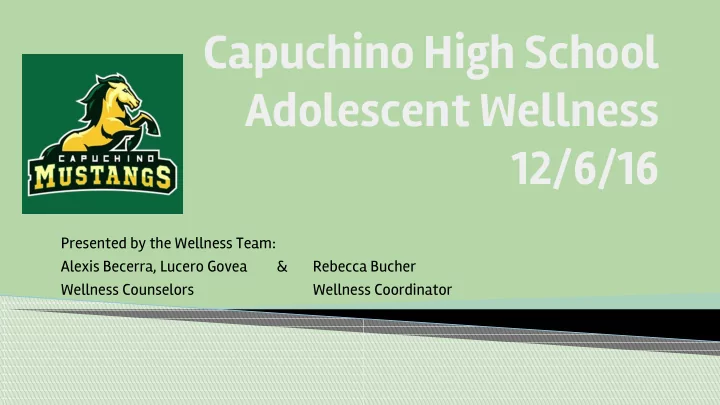

Capuchino High School Adolescent Wellness 12/6/16 Presented by the Wellness Team: Alexis Becerra, Lucero Govea & Rebecca Bucher Wellness Counselors Wellness Coordinator
Soda Bottle Shake-up
The Brain Under Stress Frontal lobe (prefrontal cortex) goes offline Limbic system / mid and lower brain functions take over J. Dorado (2014), UCSF HEARTS, Child & Adolescent Services, UCSF/SFGH
In other words… https://www.youtube.com/watch?v=gm9CIJ74Oxw Dr. Dan Siegel: The Power and Purpose of the Adolescent Brain
Teens brains are different ● The brain is not fully developed until age 25! ○ The prefrontal cortex, where logic and reasoning occurs, is the last to fully develop ● They don’t have peripheral awareness ○ they can’t see/hear past their immediacy (sometimes literally) ● Their emotional brains (limbic system) are very sensitive and their rational brain is less developed. ○ This is why they are more sensitive and emotional in their pre-teen and teen years. ○ Actually less to do with hormones and more with brain development. ● Teens need to sleep more (9.25 hours/night) ○ Sleep deprivation can lead to irritability, depression and impulsivity
Data of adolescent mental health trends From the CDC Children aged 3-17 years were identified as having a current diagnosis of ● Attention-deficit/hyperactivity disorder (ADHD) (6.8%) ● Behavioral or conduct problems (3.5%) Anxiety (3.0%) ● ● Depression (2.1%) ● Autism spectrum disorder (1.1%) ● Tourette syndrome (0.2%) (among children aged 6–17 years) *Suicide was the second leading cause of death among adolescents aged 15-19 years in 2014. From the California Healthy Kids Survey 2013-15 (all California) Chronic Sad or Hopeless Feelings, Past 12 Months Grade 9 Grade 11 31.7% 33.8% Seriously Considered Attempting Suicide, Past 12 Months Grade 9 Grade 11 19.3% 18.7% From the California Healthy Kids Survey 2013-15 (CHS) Chronic Sad or Hopeless Feelings, Past 12 Months Grade 9 Grade 11 26 % 31% Seriously Considered Attempting Suicide, Past 12 Months Grade 9 Grade 11 14% 12%
What we’re observing at CHS
Adolescent Behaviors Developmentally appropriate teen behaviors Teen behaviors that cause concern Wanting to spend more time with peers and less time Not wanting to spend time with either family or friends, with family i.e. shunning all social activity Reluctance to get up early for school Absolute refusal to attend school—especially if this behavior happens suddenly and accompanies other signs of distress or depression Needing more sleep or developing a larger appetite Sudden changes in energy levels, i.e. sleeping abnormally during growth spurts long or not being able to sleep at all; sudden changes in appetite, i.e. consistent overeating or undereating accompanied by quick fluctuations in weight Sadness and anxiety following fights with friends or a Sadness and anxiety that doesn’t correct itself or romantic breakup decrease in intensity after a few days to a couple weeks.
Adolescent Behaviors Developmentally appropriate teen behaviors Teen behaviors that cause concern Some light risk-taking or experimenting with sex, Extremely risky behavior and/or delinquent behavior, alcohol, drugs, or self-harming behaviors such as including disregard for house rules, parents’ concerns, cutting or laws of society; turning to cutting as a form of emotional and physical release Turning to a beloved pet for comfort instead of a Deliberately harming family pets or torturing or killing parent or friend any animal Worrying about physical appearance and trying to fit in Sudden and significant changes in eating behaviors, over-exercising, and other indications of eating disorders Moodiness, sensitive, emotional Extreme highs and lows, or prolonged sadness or irritability
What can you do?
Talk to your teen! Encourage your teen to talk: Allow your teen to share his/her point of view ★ Show respect ★ Acknowledge and validate teen’s feelings ★ Summarize to make sure that you understand what he/she said ★ Give your teen your full attention ★ Stop what you were doing or set-up a time to talk ★ Remain quiet ★ Listen to what your teen has to say ★ Refrain from jumping in to fix the problem ★ Use encouraging non-verbal behaviors ★ ★ If you are concerned about their safety, do not be afraid to ask them
Ask for on-campus assistance. Trusted faculty or staff member School Counselors SPED Case Managers Wellness Counselors Family Engagement Coordinator: Dulce Hatch School Resource Officer (SRO): Scott Rogge Administration & Dean
Access Community Resources CONFIDENTIAL SUPPORT ★ Crisis Text Line: Text “Start” to 741-741 ★ Starvista 24/7 Crisis Hotline: (650) 579-0350 ★ Parent 24/7 Support Line (call/text)- Star Vista: (650) 579-0358 (English, Spanish, Mandarin) FOR ONGOING MENTAL HEALTH SERVICES ★ Referral from pediatrician for mental health provider ★ Behavioral Health & Recovery Services (BHRS) Access Call Center 800/686-0101; TDD 800/943-2833 ★ Visit www.psychologytoday.com for local providers ★ Community agencies
Mental Health Emergencies (danger to self or others) Call 9-1-1 or go to your nearest hospital emergency room if you can safely get there. Psychiatric Emergency Services (PES) are available at: Mills-Peninsula Medical Center San Mateo Medical Center 1501 Trousdale Drive, Burlingame, CA 94010 222 West 39th Ave., San Mateo, CA, 94403 Phone: (650) 696-5915 Phone: (650) 573-2662 Get Immediate Help If you or someone you know is experiencing a mental health emergency or is in a life threatening situation, call 9-1-1 and say: “I’m calling about a mental health emergency and request a CIT (Crisis Intervention Trained) Officer.” We all want to protect the people we love, but sometimes we cannot do it on our own. If a family member or friend is in a mental health crisis and at risk of harming themselves or others, call the police – even though you or your family member may be upset or afraid – to help ensure everyone’s safety.
References California Health Kids Survey, 15th Biennial Statewide Survey 2013-2015, http://surveydata.wested.org/resources/Biennial_State_1315.pdf Centers for Disease Control & Prevention, http://www.cdc.gov/childrensmentalhealth/data.html, http://www.cdc.gov/nchs/data/nvsr/nvsr65/nvsr65_05.pdf, https://www.cdc.gov/violenceprevention/pdf/suicide-datasheet-a.pdf County of San Mateo Health System, http://www.smchealth.org/mh911 Georgetown Behavioral Health Institute, http://www.georgetownbehavioral.com/node/1166 Dr. Erica Reischer “What Great Parents Do” National Institute of Mental Health, www.nimh.nih.gov
Recommend
More recommend